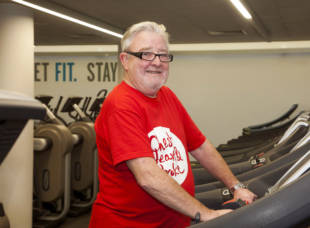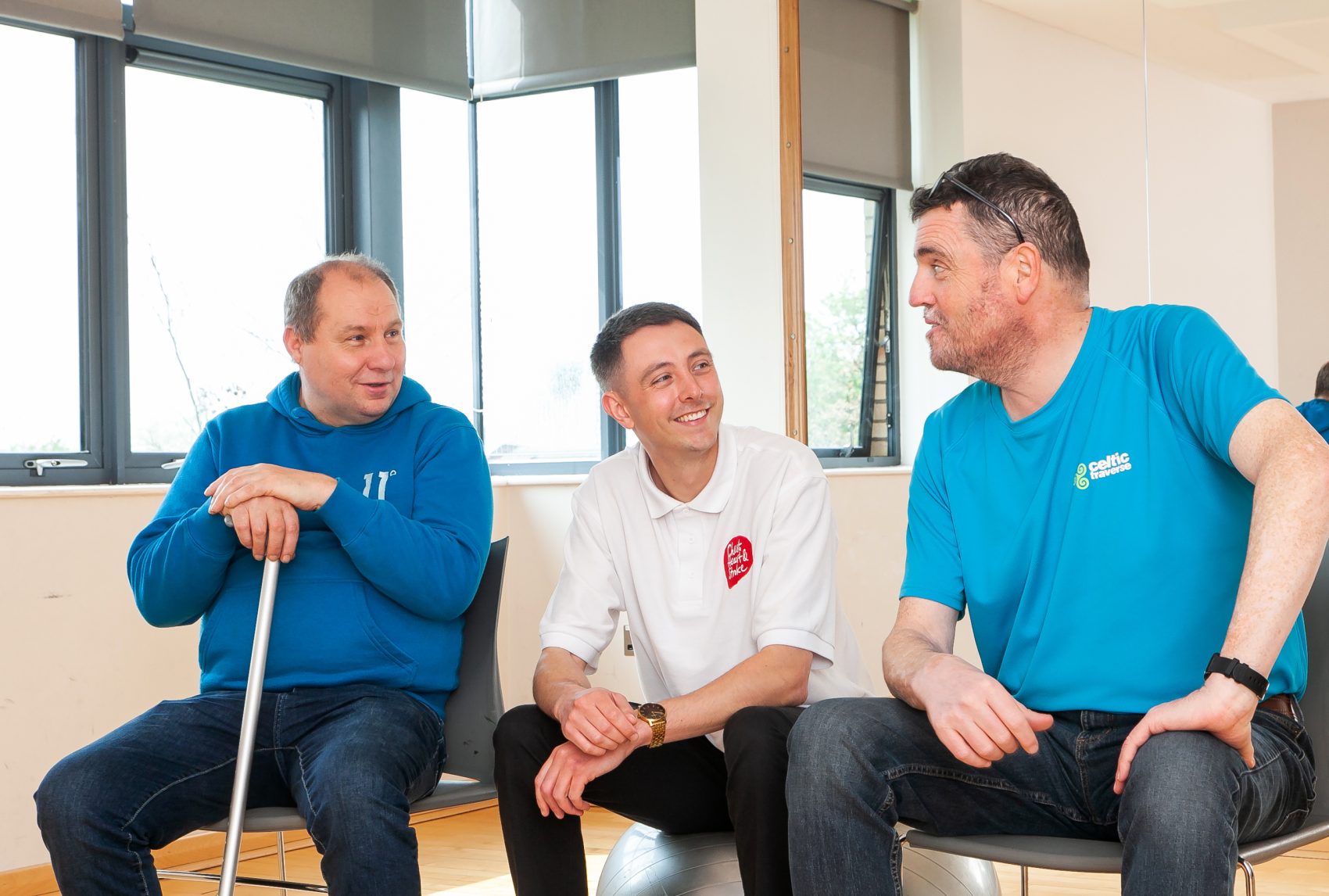Chest, Heart or Stroke conditions can affect all parts of life, not just our health. If you are living with these long term conditions you may also have to learn to how to cope with changes to other aspects of your work, social or family life.
We deliver a range of support services to people affected by chest, heart and stroke conditions and their families. We help thousands of families every year to cope with the impact, and to support them to live to the full.
When you have a stroke, your life is very much before and after. This is for the whole family. But what’s done is done. You have to learn how to enjoy life again, accept this challenge and move forward.

The following information is general and not exhaustive, but offers some basic guidance on issues often experienced by people living with long–term conditions.
If you are affected by a chest, heart or stroke condition, we have an experienced and compassionate team who can help you with the skills, knowledge and the right services which will make a real difference to your health, wellbeing and overall recovery.
Download our Life After Stroke Leaflet
The leaflet includes advice and tips from stroke survivors on navigating common, everyday issues following a stroke.
-
Life After StrokeDownload pdf
-
Living with a long–term health condition affects many aspects of your life. There are the physical symptoms like getting out of breath, feeling tired or having pain.But long–term health conditions can also affect your feelings, and may have a major bearing on how you cope.
Anxiety is a feeling of unease, such as worry or fear, that can be mild or severe. For some of us, anxiety starts after a long, slow build–up of stress. It can also start when we don’t feel in control of certain aspects of our lives, such as our health. This can make us worry about the future in general. For others, anxiety may be brought on by a single stressful event.
Feelings of anxiety can cause physical symptoms such as:
- A racing heart
- Sweating
- Feeling a need to go to the toilet
- Loss of concentration
- Irritability
- Breathlessness
If you start to feel anxious, it may help to try some breathing exercises or relaxation techniques. Often just concentrating on your breathing will take your mind off your immediate worries and help reduce your heart rate.
If you feel depressed or anxious, the first step is to talk to your loved ones about your concerns. Talking may also help them, because they will have their own worries about you.
It can also help to talk to other people who understand what you are going through. At NI Chest Heart & Stroke we have a range of services where you can talk to our co-ordinators or other people with the same health conditions.
Find out more about the support services that we offer. -
Your GP is just one of a number of healthcare professionals who may be involved in looking after you and treating your condition. Good communication with your doctor and other specialists such as your practice nurse, pharmacist or physiotherapist will help you manage your health.
It is important that you understand what they say – and that they understand your concerns, and take your views into consideration when they are planning your treatment.
Tips when visiting your doctor:
- Make a list of questions and concerns before your visit. List these in order of priority.
- If you have many questions, ask for a longer appointment or make a second one.
- Show your list to your doctor and decide together what you will discuss during this visit.
- Do not avoid asking questions because you are embarrassed. Your doctor is there to help.
- Bring a friend or family member for support.
- Do not leave your appointment feeling that you do not fully understand what your doctor is saying. If something is unclear, ask for more information.
- Ask your doctor to write answers down for you to refer to later.
Find out more about the support services that we offer.
-
Community support services to help you manage at home are usually arranged through Social Services within in your local Health and Social Care Trust.
Contact with Social Services can be in a number of ways. You may:
- Self refer by contacting the Social Services team in your area
- Be referred by a GP or someone who works for the Health Trust
- Be referred by a voluntary organisation
- Be referred by a family member or informal carer.
You will have to have your needs assessed by Social Services before they will provide support for you. This is called a community care assessment or, for carers, a carer’s assessment.
Once you have been assessed, the social worker can tell you about what services are available and whether you have to pay for them. Services can vary from area to area but might include:
- A home help or care assistant
- Delivery of meals to your home
- A place at a day centre or within a community group
While community care assessments and carer assessments are free, Social Services can charge for some community care services. The regulations about which services must be paid for, and how much can be charged, are complicated, so you should seek advice.
Citizen’s Advice can give you independent advice. More information can be found at NI Direct.
-
If your condition has affected your vision, you may find using computers difficult. The RNIB’s website has lots of useful information to help you make your computer more accessible.
Click here to go to their website and find out more.
If you are unfamiliar with computers, CLICK HERE for a website may be able to help you get started. It explains all the jargon and explains how Facebook and other social media work.
-
If you’ve had, or currently have, a medical condition or disability that may affect your driving you should speak to your doctor or check with the Driver & Vehicle Agency (DVA).
For more information on telling the DVA about your condition click here
You should also seek advice from your insurance company to make sure it covers your medical condition.
COPD
If you have been diagnosed with COPD there are usually no restrictions on driving your own car and the DVA need not be notified, except if you have attacks of breathlessness which leave you with disabling light headedness, fainting or loss of consciousness.
SLEEP APNOEA
You must tell the DVA if you have sleep apnoea with symptoms that can affect your ability to drive.
STROKE and TIA
Stroke is a condition which could affect your ability to drive and so you must report it to the DVA. Everyone has to stop driving for one month after a stroke or TIA.
Whether or not you can then return to driving depends on how your stroke affected you, especially your vision and the mobility of your arms and legs. If you have disability in your limbs, this does not mean you will never be able to drive again, but it may mean you have to drive an automatic or adapted car.
In all cases, please seek medical advice from your GP about whether you can drive again.
You do not need to tell the DVA if you have had a single TIA (mini–stroke). However, you must tell them if you have had more than one recently.
HEART CONDITIONS
There are many different types of heart disease and details of the specific rules for each can be found on the DVA website. In general…
Angina – you do not have to tell the DVA if you are diagnosed with angina, unless you are a bus, coach, lorry or taxi driver.
Angioplasty – you do not have to tell the DVA if you have had any type of angioplasty, unless you are a bus, coach, lorry or taxi driver.
Arrhythmia – you must tell the DVA if you have arrhythmia.
Congenital Heart Disease – you must tell the DVA if you have congenital heart disease.
Coronary Artery Bypass – you do not have to tell the DVA if you have had a coronary artery bypass, unless you are a bus, coach, lorry or taxi driver.
Heart Attack – you do not have to tell the DVA if you have a heart attack, unless you have had pain while driving, or sudden and disabling attacks of dizziness, loss of awareness, confusion or fainting. It may, however, be advisable to stop driving for a few weeks after a heart attack. If you are a bus, lorry or taxi driver you must stop driving public service vehicles immediately and contact the DVA.
Heart Failure – you do not have to tell the DVA if you have heart failure, unless you are a bus, lorry or taxi driver.
Heart Palpitations – you must tell the DVA if you have heart palpitations.
High blood pressure – you do not have to tell the DVA if you have high blood pressure, unless you are a bus, lorry or taxi driver.
Low blood pressure – you do not have to tell the DVA if you have low blood pressure, unless you are a bus, lorry or taxi driver.
Pacemaker – you must tell the DVA if you have been fitted with a pacemaker.
Tachycardia – you must tell the DVA if you have tachycardia.
Valve disease or a replacement heart valve– you must tell the DVA if you have valve disease or a replacement heart valve.

"The PREP classes helped me to get back my coordination and confidence. Four weeks after my stroke I was back driving."
-
With a little forward planning, you can protect your health when travelling to Europe and avoid unexpected medical bills. Your existing European Health Insurance Card (EHIC) or a new UK Global Health Insurance Card (GHIC) gives you the right to access state-provided healthcare during a temporary stay in the EU.
If you have a UK European Health Insurance Card (EHIC) it will be valid until the expiry date on the card. Once it expires, you’ll need to apply for a GHIC to replace it.
An EHIC or GHIC is not a replacement for travel insurance - make sure you have both before you travel.
If you have a pre-existing medical conditions, you should make the insurance company aware so that you are adequately covered.
An EHIC or GHIC gives access to state–provided medical treatment, but you should be aware that this might not cover all the things available on the NHS in the UK and a contribution to the cost of your care may be needed.
Different rules apply if you are traveling to Switzerland, Norway, Iceland or Liechtenstein - you can find out more on the UK Government website here.
You can find out more and apply for an GHIC on the NHS Website.
-
Flu is a highly infectious illness that spreads rapidly through the coughs and sneezes of people who are carrying the virus.
Anyone can get flu, but it can be more serious for certain people such as:
- those aged 65 or over
- those with a serious medical complaint, such as a lung condition, a heart condition or stroke
If you are in one of these groups, you are more vulnerable to the effects of seasonal flu (even if you’re fit and healthy) and could develop more serious illnesses, such as bronchitis and pneumonia.
Flu can also make existing medical conditions worse.
The best time of the year to get a flu vaccination (flu jab) from your GP is in the autumn. It’s free and is effective against the latest strains of the virus.
You need a new flu vaccination every year because the viruses that cause the illness are constantly changing.
More information can be found at Flu Aware NI www.fluawareni.info/
The Pneumo VaccinationWhen you see your GP for a seasonal flu inoculation, ask whether you also need the ‘pneumo jab’ to protect you against some forms of pneumococcal infection. It’s available to everyone aged 65 or over, and for younger people with some serious medical conditions.
-
Most people with existing medical conditions are able to travel by air without difficulty. However, certain precautions sometimes need to be taken. If you plan to fly, consult your doctor before you book.
You will need medical clearance to fly if:
- You need any special medical provision e.g. oxygen
- Your fitness is in doubt as a result of:
- a recent illness
- a period in hospital
- surgery
- you have an acute or chronic condition that is unstable
If any of the criteria above apply, you and your doctor will need to complete a Medical Information Form (MEDIF), which is available from the medical department of the airline or your travel agent.
Remember that many airlines will charge extra for providing oxygen and will not allow you to use your own on board.
- Think about your destination and how it suits your needs
- Allow yourself plenty of time to get to the airport or the holiday location.
- Don’t carry heavy pieces of luggage.
- If your mobility is limited or walking long distances in an airport will be difficult, you can request Special Assistance. The service is provided by the airports for free but should be arranged through your airline.
- Plan your activities so you do not need to rush around
- Take time to relax each day.
- Eat and sleep well to avoid becoming run down.
- Take enough medication for the whole holiday. If you are flying, carry it in your hand luggage.
- Take a list of your medications and a brief medical history in case you need it.
- Make sure you have a European Health Insurance Card (EHIC)
- Make sure you have travel insurance
The information above is general and not exhaustive.
-
Medication can play a big role in how well you feel and the way you take your prescribed medicines can make a big difference to their effectiveness. But it is easy to make mistakes without even realising. Be careful always to follow directions when taking any medication. If you have questions, concerns or are experiencing undesirable side–effects, speak to your doctor, nurse or pharmacist.
-
Continuing or resuming your sex life can be an important part of recovery, but there may be some physical and emotional issues that need to be considered.
A common fear is that sex might cause another stroke or heart attack but this is very unlikely. If you are worried, however, you should speak to your doctor.
Disabilities such as weakness or paralysis of limbs, or fatigue and breathlessness, may cause some problems. These can usually be overcome by talking to your partner and experimenting.
Some medications can also interfere with your sex life. Discuss any side effects with your doctor. He or she may be able to resolve the problem.
Having a long–term health condition often affects the way you see yourself or how you believe your partner will see you. This can result in a loss of self–confidence, lowered self–esteem and lack of interest in sex. The change in your relationship from being partners to becoming ‘patient’ and ‘carer’ can also affect the way you see each other. The first step in dealing with any sexual problems is to talk about them with your partner. It may also be useful to speak to a relationship counsellor such as Relate.
When you are ready to resume your sexual relationship, think about the following
- Avoid sexual activity immediately after a heavy meal, after consuming alcohol, in an uncomfortable room temperature or when under emotional stress. All of these factors will only increase fatigue.
- Choose sexual positions that are less energy consuming
- Have your partner take a more active role so that you feel less fatigued or anxious.
- If you use inhalers or GTN spray, keep them where you can reach them if needed.
It is also important to remember that simply being close to someone helps a person feel loved and special.
-
Some people with long–term health conditions find social situations difficult. You can feel isolated, believing that your friends and colleagues cannot understand what you are going through. You might even avoid people, fearing that they might ask questions about your health or feel sorry for you.
It may seem easier to stay at home in your comfort zone, but this is a vicious circle, leading to isolation and worsening your fears.
Even though you are relying on other people to understand and co–operate, don’t be disheartened before you try. Your illness may have affected you, but you are still the same person inside.
Try not to shut people out. Remember that if the roles were reversed you would want to offer help and support. By allowing others to understand, accept and support you, you will start to feel more positive and enjoy getting out and about.
At NI Chest Heart & Stroke, we co–ordinate a range of services that could help you resume your social life. Call us on 028 9032 0184 for more information.

"I am back playing golf. I can’t walk the full course and have to use a buggy, but getting back to my favourite hobby has been very important to me."
-
Your travel agent may not be able to provide adequate cover if you want to go abroad and have a specific health condition. Sometimes more specialised insurance policies are more suitable.
Shop around and ask as many questions as you can about exactly what your cover will provide.
Below is a list of insurers who accommodate people with pre–existing medical conditions. This list is not exhaustive nor is it an endorsement for any of these companies. It is designed only to provide you with a starting point for researching the market. We endeavor to keep this list as up to date as possible however changes to policies and company details may occur and we apologise in advance if these are missed.
-

"Being part of the Young Stroke group has increased my confidence. I have gone back to work, which is tiring but gets me out of the house."
Continuing with your job or returning to it may be important for personal and financial reasons. It is sometimes difficult, however, if you suffer from tiredness, difficulty in concentrating, physical disability or any other debilitating aspect of your condition.
But the law is on your side. It’s unlawful for an employer to dismiss you on the grounds of chronic illness or because you need regular treatment. Under the Disability Discrimination Act, your employer must make reasonable changes to your workspace and working conditions to help you do your job.
You should talk to your employers about their expectations and yours, because
- The remit of your job or your work pattern may need to be adjusted
- You should avoid taking on too much too soon
- It is advisable to work reduced hours in the first instance, since tiredness may still be an issue
- Working flexible hours may also be helpful, particularly if you have good days and bad days
Sometimes it can be an opportunity to try something else such as:
- Changing jobs
- Working part–time
- Enrolling on a training course
- Returning to education
- Volunteering – working in the voluntary sector can be a great way of building up confidence and getting back into a working environment. It is also very fulfilling.
This information is general and not exhaustive. More advice on Employment Rights can be found on the Department of Employment and Learning and NI Direct Government Services or from your local Citizen’s Advice Bureau.
-
If your health has affected your ability to work or to care for yourself, you may be entitled to financial and practical support.
The Social Security Agency assesses and pays benefits Carers’ Allowance to people in Northern Ireland.
Community support services to help you manage at home are usually arranged through Social Services within in your local Health and Social Care Trust.
Sometimes people who are entitled to claim benefits and allowances fail to do so, either because it seems so complicated or because it feels like asking for charity. Here are four golden rules:
- It is always worth checking to see if there are benefits that apply to you.
- One benefit often acts as a passport to others.
- Apply for benefits as soon as you can – many cannot be backdated.
- If your claim is turned down or you receive less benefit than you feel you are entitled to, you can appeal.
The Social Security Agency assesses and pays benefits such as Disability Living Allowance (DLA), the new Personal Independence Payment (PIP), Attendance Allowance or Carers’ Allowance to people in Northern Ireland.
The benefits system is complex and changes frequently, so it is important to get advice about what you are entitled to and how to fill in the necessary forms.
The table below will give you an indication of which benefit(s) you may be entitled to. The information is general and not exhaustive.
Age Employment Situation Benefit Under
16 yrs oldn/a Disability Living Allowance (DLA) 16–64
yrs oldEmployed but
off work sickYou may be able to claim Statutory Sick Pay(SSP) from your employer for up to 28 weeks depending on how long you have been employed, your age, and how much you earn.
When your entitlement to SSP ends you may be able to claim Employment and Support Allowance.
Employed and
back at workIf you go back to work, you may be entitled to an increase in Working Tax Credit. Unable to return
to workPreviously you would have applied for Disability Living Allowance (DLA). DLA is changing to Personal Independence Payment (PIP) for new claims from June 2016, and will help towards some of the extra costs resulting from having a long term condition. Over 65
yrs oldRetired Attendance Allowance, which is for people who need assistance with their personal care and/or supervision. Over 16
years old
(no upper
age limit)Carer
(at least 35
hours per week)If the person you are caring for receives DLA (middle or higher rate) or Attendance Allowance, you may be eligible for Carer’s Allowance. You do not have to be a relative of or live with the person you are caring for. You can find out more from the Department of Communities.
Citizen’s Advice can give you independent guidance about what you are entitled to.
Additional information can be found at NI Direct , including information about Blue Badges, or from Disability Action, who have a number of useful factsheets.
We are working with Advice Space to provide fast-track Welfare Rights advice for anyone who uses our services.

